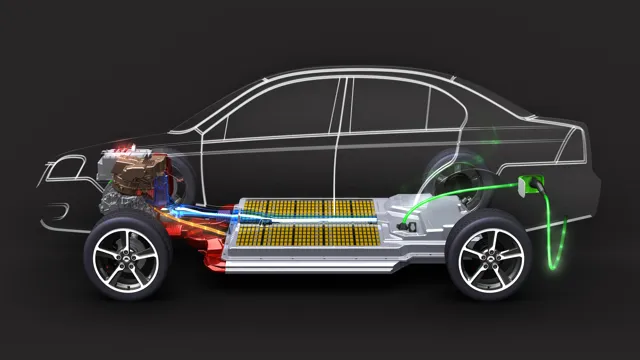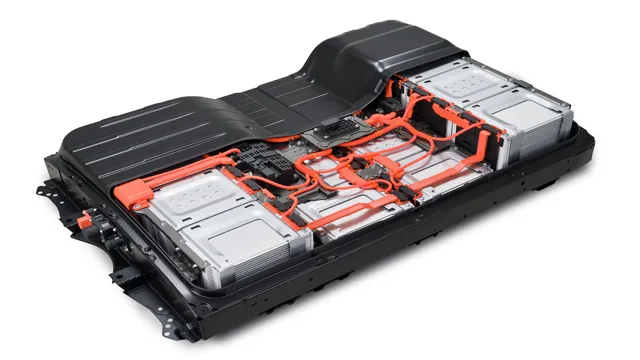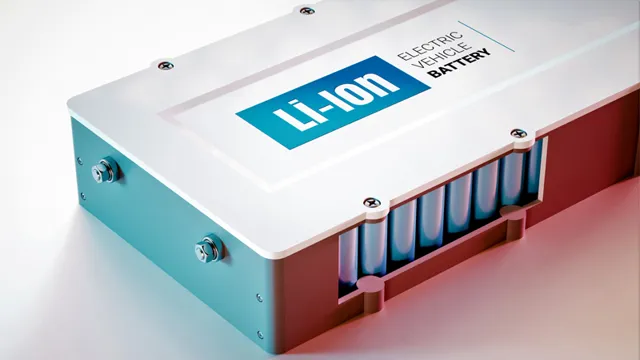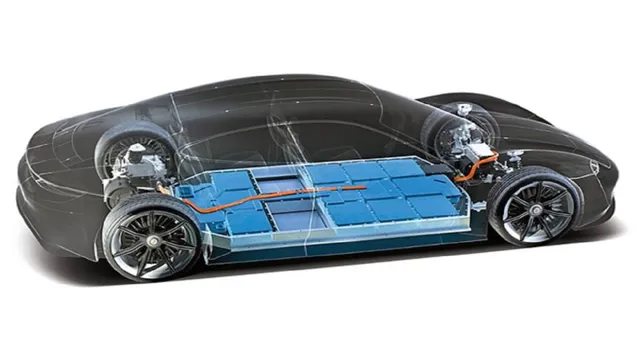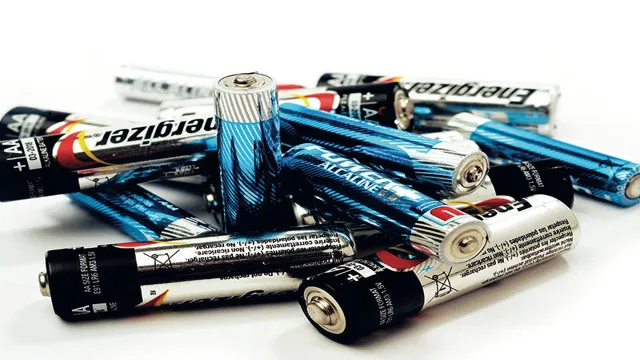The Shocking Truth: Discover How Long It Really Takes to Charge Your Electric Car Battery
Electric cars have taken the world by storm with their efficient and eco-friendly nature. However, one of the biggest hurdles for electric car owners is the battery charge time. With traditional gasoline-powered cars, filling up the tank takes just a few minutes, whereas electric cars can take several hours to fully charge, depending on the type of charger being used.
This can be a major inconvenience, especially for those who travel long distances or have hectic schedules. But fear not, as there are ways to reduce battery charge time and make owning an electric car more convenient than ever before. In this blog, we’ll explore the different types of charging options and how you can optimize your charging time to get the most out of your electric car.
What factors affect charging time?
The average time to charge an electric car battery can vary depending on several factors, such as the type of charging system, the battery size, and the charging rate. A Level 1 charging system, which uses a standard household outlet, can take up to 12-24 hours to fully charge a depleted battery. On the other hand, a Level 3 charging system, also known as DC fast charging, can charge an electric car battery up to 80% in just 30 minutes.
Battery size also plays a significant role in charging time, as a larger battery takes longer to charge than a smaller one. Lastly, the charging rate, or the amount of power being delivered to the battery, can affect the charging time as well. A high-power charging station can deliver more power to the battery, reducing charging time.
Overall, charging time can be influenced by several factors and can range from a few hours to half an hour, depending on the charging system, battery size, and charging rate.
Charging level and type
When it comes to charging your device, there are several factors that can affect the charging time. One of the most significant factors is the charging level. For instance, if your device has a low battery level, it will take longer to charge compared to when it is at a higher level.
Additionally, the type of charger used can also impact the charging time. Some chargers supply low voltage, which can make your device charge slower, while others can be fast chargers and can charge your device faster by supplying higher voltage. However, it is essential to pay attention to your device’s compatibility with different chargers since using the wrong charger can cause significant damage to your device’s battery and internal components.
Another factor that can affect charging time is the charging cable’s quality, as a low-quality cable can cause charging issues and make your device charge much slower. Therefore, it is essential to use a high-quality charging cable compatible with your device to avoid slowing down the charging process.
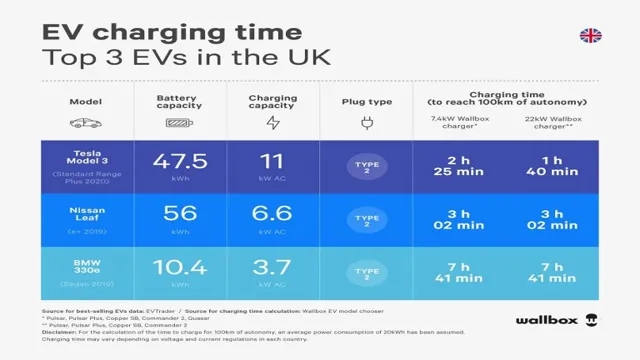
Battery size and capacity
Battery size and capacity are important factors that affect charging time. The larger the battery, the more time it will take to charge. This is because a larger battery has more energy storage capacity and requires more electricity to fully charge.
The charging time also depends on the charger’s output, rated in watts, and the battery’s charging rate. Generally, a higher wattage charger can charge a battery faster. Additionally, temperature can affect charging time.
Charging a battery at temperatures that are too low or too high can result in slower charging times. It’s important to use a compatible charger that’s designed for your specific battery size and capacity to ensure efficient charging and to avoid overcharging or damaging the battery. Taking these factors into consideration can help you determine the best charging time for your battery and ensure that it lasts longer.
Charging station power and technology
When it comes to electric vehicle charging stations, a key factor in determining charging time is the power output of the station itself. Stations with higher power outputs can deliver more energy to the vehicle’s battery in a shorter amount of time, resulting in faster charging. Additionally, the technology used in the station can also impact the charging time.
For example, stations that utilize fast charging technologies like DC fast charging can significantly reduce charging times compared to stations using slower charging methods. Other factors that can affect charging time include the size and capacity of the vehicle’s battery, temperature, and the age and condition of the battery. Optimizing these factors can help electric vehicle owners achieve faster and more efficient charging experiences.
Average Charging Times
Are you considering buying an electric car and wondering how long it will take to charge the battery? Well, the average time to charge an electric car battery can vary depending on several factors. For example, the size of the battery and the type of charger you use can affect the charging time. On average, it takes 4-8 hours to completely charge an electric car battery using a Level 2 charger.
However, if you opt for a fast charger, known as a Level 3 or DC fast charger, you can charge your battery up to 80% in just 30 minutes! Keep in mind that the charging time may also depend on the temperature and the state of the battery. It’s important to have a charging plan and to understand the charging system in your area to make sure you’re not left stranded without enough battery power. Regardless, with electric cars becoming more popular and chargers becoming more accessible, going electric has never been easier.
Level 1 Charging
Level 1 charging typically refers to charging an electric vehicle (EV) using a standard 120-volt household outlet. These chargers are often referred to as “trickle chargers” because they deliver a lower amperage power supply than higher-level chargers. Level 1 charging is the slowest form of charging, with an average charging time of 8-12 hours for a fully depleted battery.
While this may seem like a long time, it’s important to remember that Level 1 charging is designed for overnight charging or for drivers who don’t frequently drive long distances. Additionally, Level 1 chargers are generally the most cost-effective and require no installation or additional equipment. So, while it may not be the fastest form of charging, it’s a great option for those who don’t require a quick turnaround time between charging sessions.
Level 2 Charging
Level 2 charging is a popular option for EV owners who want a faster and more convenient way to charge their vehicles. On average, level 2 charging stations can charge a vehicle in about 4-6 hours, depending on the battery size and charging capacity. This type of charging uses a 240V supply and can deliver up to 30 miles of range per hour of charging.
Level 2 charging is widely available in public charging stations and can be installed at home for personal use. It is a great option for daily commuters who need to charge their vehicles overnight or for longer trips with multiple stops. With level 2 charging, EV owners can enjoy a faster and more reliable charging experience compared to level 1, which uses a standard 120V household outlet.
Overall, level 2 charging provides a faster and more efficient way to charge EVs, making it a great choice for drivers looking for a reliable option for charging on the go.
DC Fast Charging
DC fast charging is a game-changer for electric vehicle (EV) owners, providing an efficient and reliable way to recharge their vehicles on the go. The average charging time for a DC fast charger is around 30 to 45 minutes, which is significantly faster than Level 2 charging that can take several hours. The charging time varies based on several factors, such as the capacity of the battery, the state of charge, and the temperature outside.
However, DC fast charging is a convenient option for those looking to travel long distances without worrying about running out of battery. The keyword “DC fast charging” is a crucial factor when it comes to recharging your EV on the go, making it possible to drive anywhere you desire without worrying about battery life.
Tips to reduce charging time
If you’re looking to reduce the average time to charge an electric car battery, there are a few tips to consider. First, make sure you’re using a Level 2 charger, as this will cut down on charging time significantly compared to a Level 1 charger. Additionally, using a charger with a higher power output can also help reduce charging time.
Another important tip is to be mindful of how you charge your car – topping off your battery periodically instead of letting it drain completely can help reduce overall charging time. Finally, consider investing in a home charging station if possible, as this will allow you to charge your car at home overnight when rates are lower, rather than relying on public charging stations during the day. By following these tips, you can reduce charging time and enjoy more efficient and convenient electric vehicle ownership.
Upgrade Your Charging Equipment
If you’re an electric vehicle owner, you know that charging time can be a nuisance, especially if you’re in a hurry. One way to reduce charging time is to upgrade your charging equipment. A high-powered Level 2 charger can provide faster charging speeds than a standard Level 1 charger.
Additionally, consider purchasing a portable Level 2 charger so that you can charge your EV on the go. It’s also important to make sure that your charging equipment is correctly installed and functioning properly. By taking these steps, you can significantly reduce your EV’s charging time and get back on the road faster.
So, if you’re tired of spending hours waiting for your EV to charge, upgrading your charging equipment is definitely worth exploring.
Monitor Charging Efficiency
Charging our electronic devices has become a daily part of our lives, but did you know that monitoring your charging efficiency can reduce your overall charging time? One helpful tip is to avoid wireless charging as it can take longer and is less efficient than using a wired charger. Additionally, using the correct charger specified for your device can make a significant difference in charging time. It’s also important to avoid overcharging as it can damage the battery and reduce its overall lifespan.
And last but not least, closing all apps and turning on airplane mode while charging can speed up the charging process. Remember to keep these tips in mind to reduce your charging time and maintain the efficiency of your devices.
Consider Battery Maintenance
As our reliance on technology continues to grow, so does our need for battery maintenance. Whether you’re using a laptop, tablet, or smartphone, a dead battery can ruin your plans for productivity or entertainment. Luckily, there are a few easy tips to reduce your charging time and extend the life of your battery.
One option is to adjust your screen brightness or close unused apps to minimize your device’s power usage. Additionally, investing in a high-quality charger and avoiding fast charging can help preserve battery health. It’s also important to keep your device at a moderate temperature, as extreme heat or cold can damage the battery.
By implementing these simple strategies, you’ll be able to make the most of your device’s battery and avoid the frustration of a dead battery in the middle of a busy day.
Conclusion
As electric cars become more popular, the question of how long it takes to charge their batteries is on everyone’s mind. The answer, of course, is that it depends. Factors like the size of the battery, the type of charger, and the availability of charging ports all play a role in determining the average time to charge an electric car battery.
But one thing is for sure: with the technology improving every day, the days of waiting overnight for a full charge are slowly but surely becoming a thing of the past. So, if you’re considering an electric car, just remember: it may take a little longer to charge than a gas-powered vehicle, but the benefits to the environment and your wallet are well worth the wait!”
FAQs
How long does it usually take to charge an electric car battery?
The average time to charge an electric car battery can vary depending on the size of the battery and the charging station being used. Typically, a Level 2 home charger can charge a fully depleted electric car battery in 4-8 hours, while a fast DC charger can charge it up to 80% capacity in 30 minutes to an hour.
Can you charge an electric car battery using a regular household outlet?
You can charge an electric car battery using a regular household outlet, but it will take much longer compared to using a Level 2 charger. A Level 1 charger which can plug into a standard household outlet can take up to 12-20 hours to fully charge the battery.
How much does it cost to charge an electric car battery?
The cost of charging an electric car battery varies depending on the electricity rates in your area and the size of the battery. On average, it costs around $0.13 to $0.19 per kilowatt-hour to charge an electric car battery. So, if you have a 60-kilowatt-hour battery, it would cost around $7.80 to $11.40 to fully charge it.
Can you charge an electric car battery in the rain or snow?
Electric car batteries can be charged in the rain or snow, but it’s recommended that you take some precautions to protect the charging equipment and ensure safety. You should use a charging station with water-resistant housing and avoid touching the charging equipment when it’s wet. It’s also a good idea to park the car on a dry surface and avoid exposing the charging plug to rain or snow.
